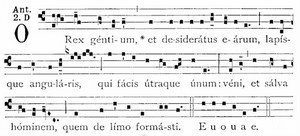22 December, O REX GENTIUM

O King of the Gentiles,
and the Desired of all nations(Hag 2:8),
you are the cornerstone (Is 28:16)
that binds two into one (Eph 2:14).
Come, and bring wholeness to man
whom you fashioned out of clay (Gen 2:7).
The Desired of All Nations
Today we lift our voices to Christ, calling Him King of the Gentiles and the Desired of all nations. The O Antiphon draws upon the second chapter of the prophet Haggai. With the temple still in ruins after the Babylonian exile and the project of rebuilding it daunting, Haggai speaks a word of comfort to Zerubbabel, the governor; to Joshua, the high priest; and to all the remnant of the people.
“Take courage, O Zerubbabel, says the Lord;
take courage, O Joshua, son of Jehozodak, the high priest;
take courage, all you people of the land, says the Lord;
work, for I am with you, says the Lord of hosts,
according to the promise that I made you when you came out of Egypt.
My Spirit abides among you; fear not.
For thus says the Lord of hosts:
Once again in a little while, I will shake the heavens and the earth
and the sea and the dry land; and I will shake all the nations
and the Desired of all nations shall come;
and I will fill this house with splendour, says the Lord of hosts” (Hag 2:4-8).

The O Antiphon uses but one phrase from this passage: the Christological title “Desired of All Nations.” In order to grasp the significance of the title we must listen to Haggai’s message of comfort and hope in its entirety, repeating it and praying it over it until it inhabits us.
The Beauty of the Infant Christ
The “Desired of all nations” will indeed come to the temple to fill it with His splendour. Simeon, recognizing the beauty of the Infant Christ, will call Him “a light of revelation to the gentiles and the glory of God’s people Israel” (Lk 2:32). The prophetess Anna will “give thanks to God and speak of the Child to all who were looking for the redemption of Jerusalem” (Lk 2:38). The arrival of the Infant Christ in the temple is the long-awaited arrival of “the desire of the everlasting hills” (Gen 49:26).
Aspirations Toward Christ
By calling the Messiah the “Desired of all nations,” Scripture and the liturgy recognize the aspirations of every nation and culture toward the good, the true, and the beautiful, as aspirations toward Christ. Every time a human being seeks the splendour of the truth, the radiance of beauty, the purity of goodness, he seeks Christ, the “Desired of all nations.”
Christ the King
The plan of God is to bring all nations under His kingship through the election and setting apart of Israel. The Messiah comes to Israel in order to come through Israel to all nations. Before His Ascension, Jesus makes this clear, saying, “Go therefore and make disciples of all nations, baptizing them in the name of the Father and of the Son and of the Holy Spirit, teaching them to observe all that I have commanded you; and lo, I am with you always, to the close of the age” (Mt 28:19-20). It is noteworthy that the last words of Jesus in Matthew’s gospel repeat the words of Haggai’s prophecy: “I am with you.”
Our Peace
The antiphon goes on to celebrate Christ as the the cornerstone that, out of two peoples, Jews and Gentiles, makes one. In the letter to the Ephesians Paul says, “He is our peace, who has made us both one, and has broken down the dividing wall” (Eph 2:14).
Save Man Fashioned Out of the Clay of the Earth
The petition of today’s Great O is particularly moving. The liturgy reaches all the way back to the second chapter of Genesis for it. We beg Christ to come and “save man whom He fashioned out the clay of the earth” (Gen 2:7). We ask to be refashioned, reshaped, reformed by Christ, the Word through Whom all things were made. It is a bold petition: “Come, Christ, make me over, change me, reshape all that is misshapen in me.”
In the mystery of the Most Holy Eucharist, Our Lord answers our prayer. The Holy Spirit is sent in every Mass to change not only bread and wine into the Body and Blood of Christ, but to change us, to reshape all that is misshapen, to restore to wholeness all that is fragmented, and to beauty all that has fallen into unloveliness. “Veni, et salva hominem, quem de limo formasti.” Come — come eucharistically — “and bring wholeness to man whom you fashioned from the dust of the earth.”
